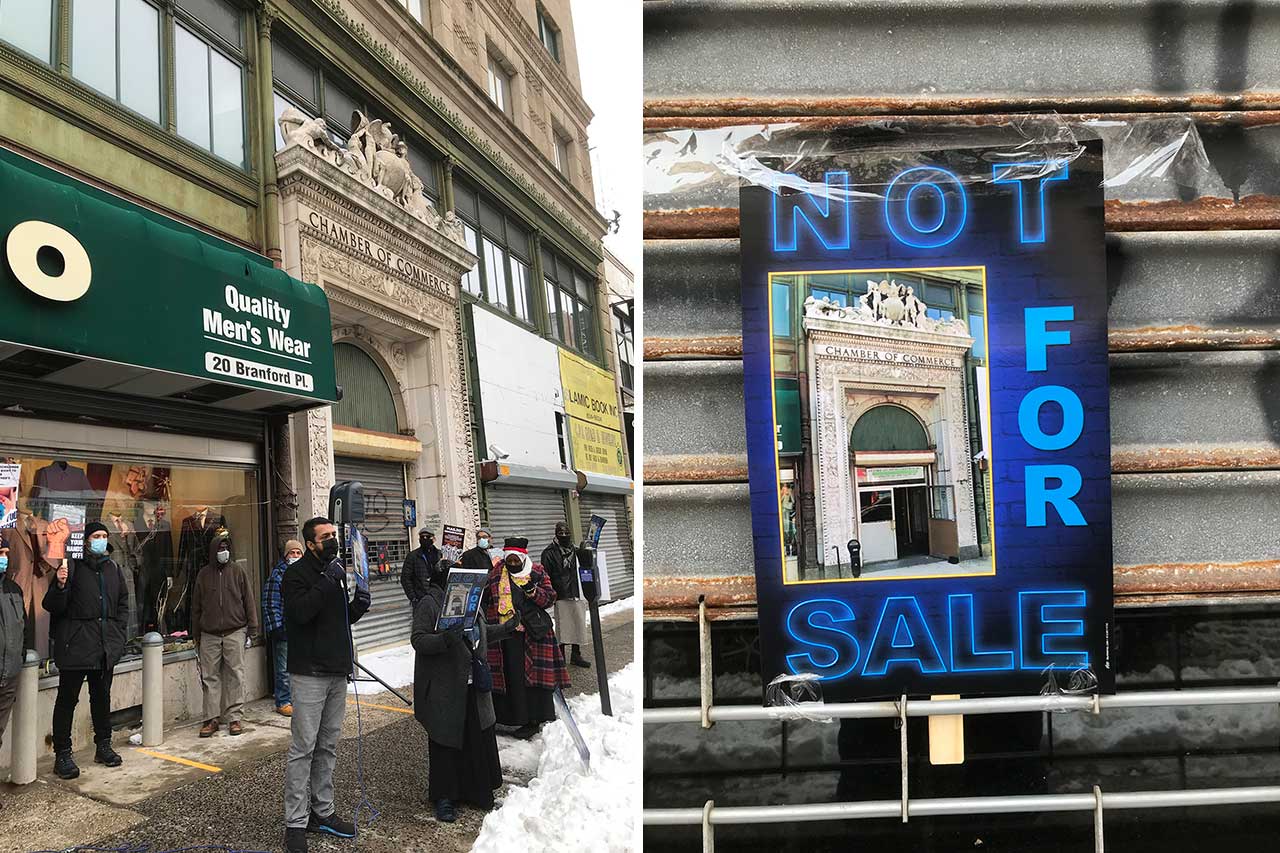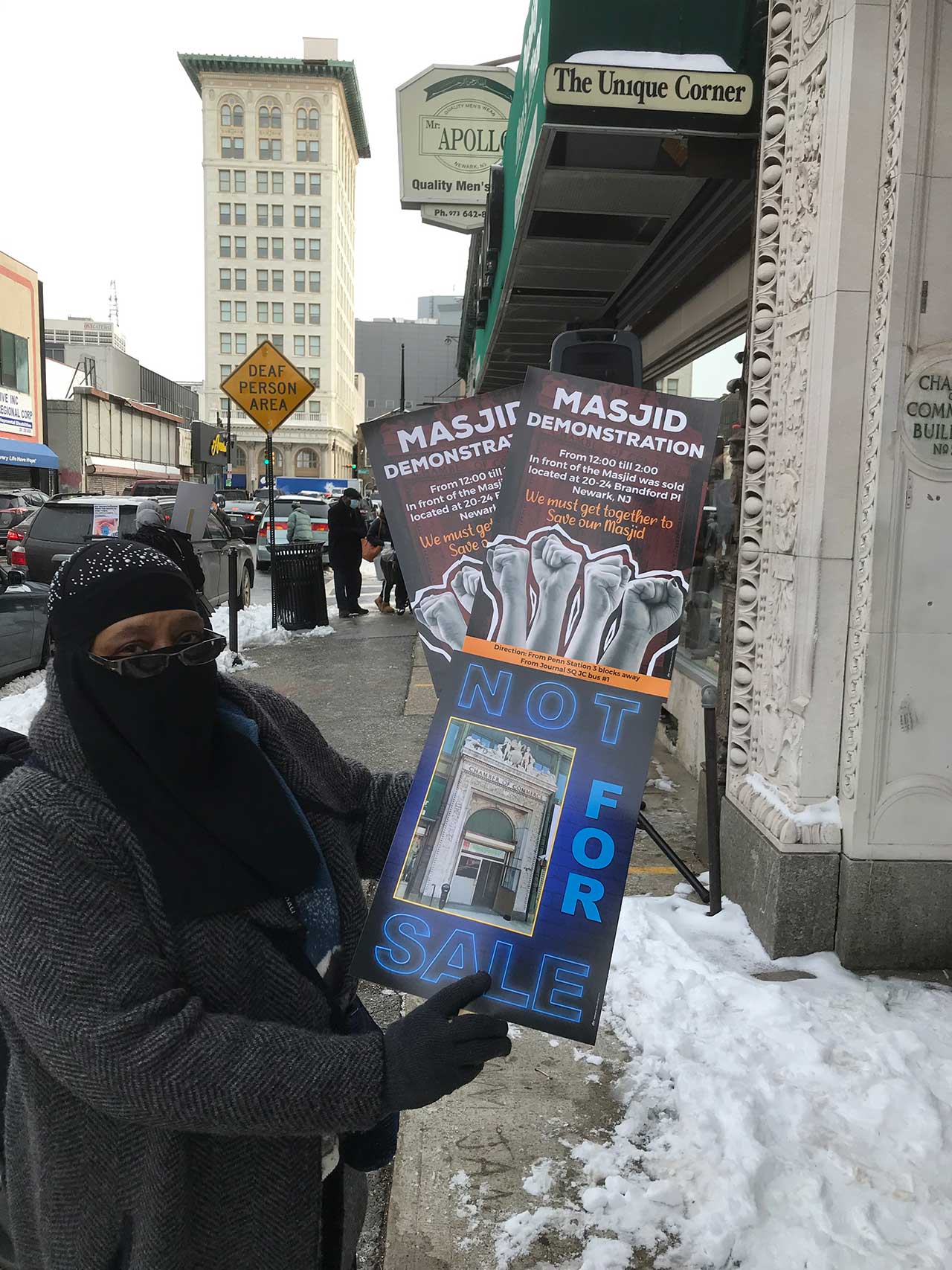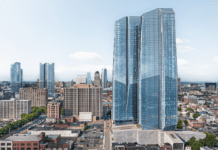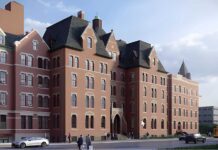
Mosque-goers in downtown Newark are caught in a messy legal battle with its board of trustees who allegedly tried to sell their historic house of worship in a backroom deal.
The Branford Masjid at 24 Branford Place, believed to be the first mosque in the Four Corners Historic District, has been the home of the Islamic Center of Essex County for the past 40 years. It is now the site of bitter weekly protests, where members hold signs that read “Not for Sale” and “Keep Your Hands Off.”
“The history and legacy that sits in this building,” said Dawn Hayes, vice president of the city’s board of education and a third-generation Muslim, at a recent demonstration, “we can’t allow anyone to take that away.”
The 11-story building, designed by well-known architecture firm Guilbert and Betelle about a century ago, was originally used as the city’s Chamber of Commerce. In 1982, however, a Saudi philanthropist, Ali Habeeb Maghrabi, gifted the building as an endowment to the Muslim community of Newark. In fact, the organization’s bylaws state that the building was to be placed in an irrevocable trust, which requires certain protocol before it can be sold, which mosque members claim was not followed.

“They want to sell the building for the miserable price of $8 million,” Khalilah Shabazz, one of the plaintiffs. “The building cannot be sold because it was given to the Islamic Society of Essex County — the masjid must stay.”
The friction between mosque members and its board began, Shabazz said, when the mosque’s longtime imam, Sheikh Ismail, passed away this year. Daily interactions became cold, according to Shabazz, who remembers an instance when a board member walked on the musala, or the prayer rug, without taking off his shoes, a show of disrespect in the Islamic faith.
The board declined to comment on these or other matters, citing pending litigation.
“No matter how you slice it, the board acted outside its powers,” said Eric Warner, the attorney representing Shabazz, “and their whole argument is that these plaintiffs don’t have standing.”
Standing is a legal term that determines whether a plaintiff has a right to file a lawsuit. The board has argued before the court that the Branford Masjid hasn’t functioned as a mosque, and therefore has no members to lay claim to the trust.
The building, however, has been closed since March, at first due to the mayor’s quarantine restrictions. Even when the citywide lockdown was lifted, the building remained closed, some allege to manufacture a vacancy in the building.
“Ever since coronavirus started, this is the only mosque that hasn’t been reopened,” said Saad Admani, a Rutgers Law School student and former president of the Muslim Student Association, who believes the intention of the closure was to “serve the mosque on a golden platter.”
Without a place to pray, some members of the mosque have been forced to offer the daily salat, one of five daily prayers, outside the building.
In fact, Shabazz, known as the “mother of the mosque,” said a few members had thrown snowballs at the second-floor window to get the attention of board members who were upstairs, but they never came to unlock the door.
Few understand the important role Newark has played as a cradle of Islamic thought in the United States. Historian Michael Nash, in the book Islam Among Urban Blacks, traces the beginning of this influence back to 1913 with the teachings of Noble Drew Ali, whose worldview had a great appeal to Black Newarkers.
According to Nash’s book, Islam spawned various organizations. The Branford Masjid, which Nash mentions in the book, represents the flowering of the Sunni Muslim tradition in the city’s downtown.
“Initially we were meeting in front of a storefront on Bank Street,” said Shakur Abdul Rahim Ibn Couser, one of the founding members of the mosque, about the early days of his religious community, before the building was donated. “We’ve been around since the beginning.”
Earlier this month, an appellate court judge denied the plaintiffs’ motion for a preliminary injunction, which would have suspended the sale of the building.
Warner briefly considered appealing that decision to the New Jersey Supreme Court, but instead opted to file an amended complaint, which, if granted, will allow him to add additional evidence and plaintiffs, including the son of Maghrabi, the late Saudi philanthropist who donated the building. Plaintiffs could move to expand the record on appeal, Warner said, but the standard is high, and it is more expeditious to amend the original record. The plaintiffs are now awaiting word from the court, which is currently in recess.
“So many people have come forward that lend credibility to the plaintiffs,” Warner said.


